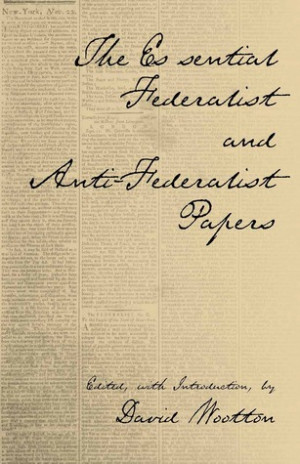

Men placed in this situation will generally soon feel themselves independent of heaven itself. In short, they are independent of the people, of the legislature, and of every power under heaven. There is no authority that can remove them, and they cannot be controlled by the laws of the legislature. There is no power above them, to control any of their decisions.

have made the judges independent, in the fullest sense of the word. But I say, this system has followed the English government in this, while it has departed from almost every other principle of their jurisprudence, under the idea, of rendering the judges independent which, in the British constitution, means no more than that they hold their places during good behavior, and have fixed salaries. I suppose it a proper provision provided they were made properly responsible. I do not object to the judges holding their commissions during good behavior.
#ANTI FEDERALIST PAPERS FREE#
The framers of this constitution appear to have followed that of the British, in rendering the judges independent, by granting them their offices during good behavior, without following the constitution of England, in instituting a tribunal in which their errors may be corrected and without adverting to this, that the judicial under this system have a power which is above the legislative, and which indeed transcends any power before given to a judicial by any free government under heaven. They are to give the constitution an explanation, and there is no power above them to set aside their judgment. But the judges under this constitution will control the legislature, for the supreme court are authorised in the last resort, to determine what is the extent of the powers of the Congress.

The judges in England are under the control of the legislature, for they are bound to determine according to the laws passed under them. They consider themselves bound to decide according to the existing laws of the land, and never undertake to control them by adjudging that they are inconsistent with the constitution-much less are they vested with the power of giv equitable construction to the constitution. I believe they in no instance assume the authority to set aside an act of parliament under the idea that it is inconsistent with their constitution. The judges in England, it is true, hold their offices during their good behavior, but then their determinations are subject to correction by the house of lords and their power is by no means so extensive as that of the proposed supreme court of the union. Certain it is, that in England, and in the several states, where we have been taught to believe the courts of law are put upon the most prudent establishment, they are on a very different footing. I question whether the world ever saw, in any period of it, a court of justice invested with such immense powers, and yet placed in a situation so little responsible. The business of this paper will be to illustrate this, and to show the danger that will result from it. The supreme court under this constitution would be exalted above all other power in the government, and subject to no control. Part two is part one of his 16th of the New York Journal of April 10, 1788. Part one is taken from the first part of the “Brutus’s” 15th essay of The New-York Journal on Ma


 0 kommentar(er)
0 kommentar(er)
